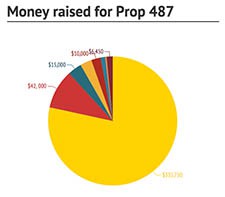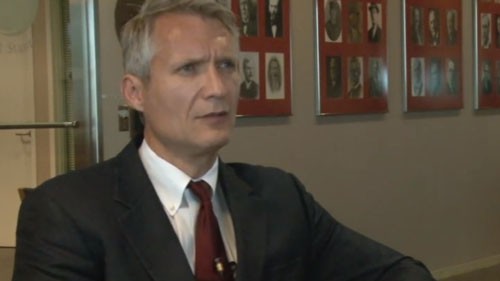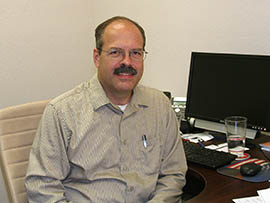Cronkite News has moved to a new home at cronkitenews.azpbs.org. Use this site to search archives from 2011 to May 2015. You can search the new site for current stories.
Phoenix voters deciding whether to alter city retirement system
PHOENIX – Supporters of a referendum that would replace this city’s pension system for new employees with a 401(k)-style plan say they’re addressing a drain on the budget as well as the practice of pension-spiking.
“It ends abuses in the system that are currently costing taxpayers many millions of dollars and transition into the 401(k),” said Scot Mussi, chairman of Citizens for Pension Reform Committee, the main group supporting Proposition 487.
Mussi’s group contends the change would save taxpayers at least $400 million over the next 20 years. But opponents contend it would wind up costing $350 million in legal fees defending against lawsuits.
“The initiative didn’t take into consideration state and local laws that it can conflict with,” said Tom Simplot, a former City Council member.
“It’s the wrong proposition achieving the wrong result and truly hurts working families,” he added.
Under the City of Phoenix Employees’ Retirement System, a defined benefit plan, retirees are guaranteed payments based on their credited service and age, regardless of returns on the pension fund’s investments. Employees contribute either 5 percent or 14.8 percent of pay toward their retirement depending on whether they were hired before the City Council raised the contribution percentage in 2013.
The system’s Actuarial Valuation Report for 2013 said it was funded at 64.2 percent of benefits owed, and the city’s contributions to its pension system have risen steadily in recent years.
Proposition 487, dubbed the Phoenix Pension Reform Act, would create accounts similar to 401(k) plans at many companies in which the employee, not the employer, bears the risk of market performance. It would require a set city contribution of 8 percent of an employee’s pay.
The change would apply to new hires, while current employees would have the opportunity switch over if they wished.
Supporters have built much of their campaign around the controversy over pension-spiking, in which public employees cash in benefits such as unused vacation pay and sick time to boost their pensions. Among those who have done so is David Cavazos, who retired as city manager in 2013.
Mussi’s group contends that pension-spiking costs Phoenix taxpayers more than $12 million a year.
The group’s signs at intersections around Phoenix urge: “Yes on 487 – Stop Pension Spiking.”
Other supporters of the initiative include Vice Mayor Jim Waring and Councilman Sal DiCiccio.
Waring said the change would lead to a better-funded retirement system.
“We had to address overall and look down the road of investments, and they haven’t done well,” Waring said. “We’re still not getting back to 100 percent funded or anywhere close.”
Campaign finance reports filed ending on Sept. 15 showed $428,200 had been raised in support of the initiative. Of that, $335,750 had come from the Arizona Free Enterprise Club, referred to as a dark money group because its nonprofit status means it has to disclose little about where its money comes from.
Signs reading “NO! on 487 – Wrong Reform, Wrong for Public Safety, Wrong for Taxpayers” are paid for by the group Fire Fighters Opposed to Prop 487.
Opponents had raised $106,878 to fight Proposition 487, nearly all of it from the United Phoenix Firefighters Association, a union.
Police and firefighters in Phoenix are covered by the separate Public Safety Personnel Retirement System. But Catherine Alonzo, a spokeswoman for Fire Fighters Opposed to Prop 487, contends that the change would eliminate disability-retirement and death benefits provided to public safety employees under the city’s pension system.
“It’s wrong and disgusting not knowing for sure when they go to work if they are going to return every day,” Alonzo said.
Although the preamble of the initiative said it won’t affect firefighters and police officers, the text of Proposition 487 doesn’t exclude them, according to a City Council report.
Brian Tobin, a Phoenix firefighter, said proposition is unclear on public safety workers, but he said the idea that dark money is fueling the campaign for the proposition is one of the reasons he’s opposed.
“This is not a citizens’ initiative; this is a dark money initiative where very rich people that we don’t know who they are and we probably never will contribute to an organization,” he said.
Mayor Greg Stanton is among the opponents.
“I support pension reform, but Proposition 487 is the wrong way to do it – it was poorly written and will have dangerous consequences we can’t afford,” he said in the publicity pamphlet provided to voters.
Mussi, who is listed as president, secretary, treasurer and director in the Arizona Free Enterprise Club’s filing with the Arizona Corporation Commission, said raising the issue of dark money is just a way to avoid discussing the city’s pension problem.
“It’s a complete distraction on the issue. Initially, opponents of the issue were not identifying donors of the initiative,” he said.
The controversy surrounding the initiative led to an independent group reviewing the pros and cons last month at Arizona State University’s Morrison Institute for Public Policy.
On the pro side, the Phoenix voters participating said the current plan could lead to city services being reduced and an increase in taxes.
Byron Schlomach, chief economist at the Goldwater Institute, a group that advocates for limited government, argued for the pro side, saying the change would save taxpayers money.
“Pension systems are easily taken advantage of by those who are in the know, while taxpayers who are not in the know get saddled with the bill,” Schlomach said.
The con side said the impact of the initiative to be unclear and would cause legal issues for the city.
“As written, Proposition 487’s impact on police and firefighters is unclear and may contribute to unintended financial and legal consequences for employees, the city and taxpayers,” according to the panel’s key findings.
After a review of the initiative, the panel said it would result in saving taxpayers at least $500 million.












